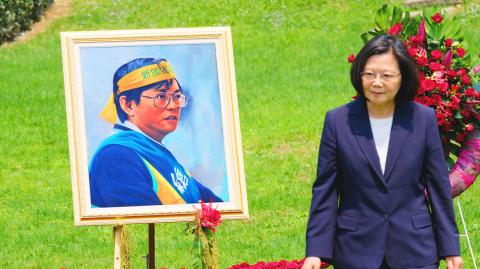President Tsai Ing-wen (蔡英文) yesterday warned of threats to the nation’s democracy and the importance of free speech as she attended a commemoration ceremony in Keelung for democracy advocate Deng Nan-jung (鄭南榕).
Yesterday’s ceremony, part of Freedom of Expression Day celebrations, marked the 30th anniversary of the death of the publisher, also known as Nylon Deng, by self-immolation in his Taipei office after a 71-day standoff with police, who wanted to arrest him on charges of sedition in January 1989 for publishing a draft “Taiwan Republic Constitution” in his magazine, Freedom Era Weekly.
“[China] wants to use our democracy against us. I simply cannot accept this, and I believe Taiwanese in general would not accept this,” she said.

Photo: Lin Hsin-han, Taipei Times
“As president I will persevere in the fight for democracy,” she said.
Free speech is not an abstract or distant concept, Tsai said, adding that her administration had already begun what Deng had sought by repealing the convictions of more than 4,000 victims of political persecution.
These annulments have been therapy for the families of the victims, she said.
The government would continue to dig up and expose injustices committed during the Martial Law era, and would move one step at a time closer toward the nation that Deng had wanted to live in, she added.
“We must allow free speech to be the shared DNA of Taiwanese. This will be the best way to remember Deng Nan-jung these 30 years later,” she said.
“Disinformation” from outside of the nation had become a credible challenge to the values that Taiwanese hold dear, she said.
Reports that China is recruiting Taiwanese Internet celebrities and buying Taiwanese-owned Facebook pages to use for “united front” efforts to erode the nation’s democracy from the inside have caused alarm in Taiwan, Tsai said.
The threat to Taiwan’s democracy is as credible as the terrorism that threatens European countries, she said.
Democracy should not be taken for granted, and it is important for Taiwanese to be brave and stand up in defense of Taiwan’s freedoms when they are under threat, the president said.
The current generation have not experienced life in Taiwan before democratic elections, but they have fought for democracy during the Wild Strawberries movement and the Sunflower movement, she said.
Ensuring freedom of speech and transitional justice are shared responsibilities of all Taiwanese regardless of generation, gender or affiliation, she said.
The Wild Strawberries movement was a student sit-in that began in front of the Executive Yuan on Nov. 7, 2008, to protest against a ban on the national flag and the playing of Taiwanese songs during a visit by a Chinese delegation led by then-Association for Relations Across the Taiwan Straits (ARATS) chairman Chen Yunlin (陳雲林) to Taipei.
The Sunflower movement was the 2014 occupation of the Legislative Yuan by students and others against the then-Chinese Nationalist Party (KMT) government’s efforts to push through legislative approval of the Cross-Strait Service Trade Agreement that had been signed on June 21, 2013, by the Straits Exchange Foundation and ARATS in Shanghai.
Additional reporting by staff writer

SECURITY: As China is ‘reshaping’ Hong Kong’s population, Taiwan must raise the eligibility threshold for applications from Hong Kongers, Chiu Chui-cheng said When Hong Kong and Macau citizens apply for residency in Taiwan, it would be under a new category that includes a “national security observation period,” Mainland Affairs Council (MAC) Minister Chiu Chui-cheng (邱垂正) said yesterday. President William Lai (賴清德) on March 13 announced 17 strategies to counter China’s aggression toward Taiwan, including incorporating national security considerations into the review process for residency applications from Hong Kong and Macau citizens. The situation in Hong Kong is constantly changing, Chiu said to media yesterday on the sidelines of the Taipei Technology Run hosted by the Taipei Neihu Technology Park Development Association. With

CARROT AND STICK: While unrelenting in its military threats, China attracted nearly 40,000 Taiwanese to over 400 business events last year Nearly 40,000 Taiwanese last year joined industry events in China, such as conferences and trade fairs, supported by the Chinese government, a study showed yesterday, as Beijing ramps up a charm offensive toward Taipei alongside military pressure. China has long taken a carrot-and-stick approach to Taiwan, threatening it with the prospect of military action while reaching out to those it believes are amenable to Beijing’s point of view. Taiwanese security officials are wary of what they see as Beijing’s influence campaigns to sway public opinion after Taipei and Beijing gradually resumed travel links halted by the COVID-19 pandemic, but the scale of

A US Marine Corps regiment equipped with Naval Strike Missiles (NSM) is set to participate in the upcoming Balikatan 25 exercise in the Luzon Strait, marking the system’s first-ever deployment in the Philippines. US and Philippine officials have separately confirmed that the Navy Marine Expeditionary Ship Interdiction System (NMESIS) — the mobile launch platform for the Naval Strike Missile — would take part in the joint exercise. The missiles are being deployed to “a strategic first island chain chokepoint” in the waters between Taiwan proper and the Philippines, US-based Naval News reported. “The Luzon Strait and Bashi Channel represent a critical access

Pope Francis is be laid to rest on Saturday after lying in state for three days in St Peter’s Basilica, where the faithful are expected to flock to pay their respects to history’s first Latin American pontiff. The cardinals met yesterday in the Vatican’s synod hall to chart the next steps before a conclave begins to choose Francis’ successor, as condolences poured in from around the world. According to current norms, the conclave must begin between May 5 and 10. The cardinals set the funeral for Saturday at 10am in St Peter’s Square, to be celebrated by the dean of the College